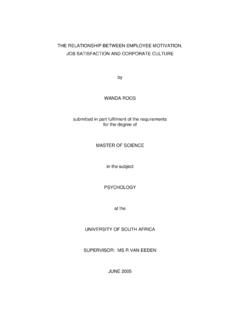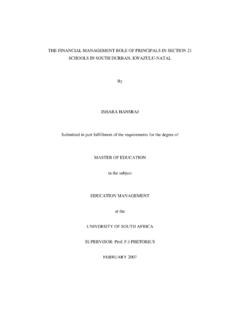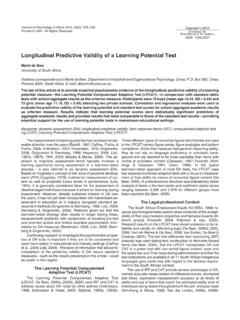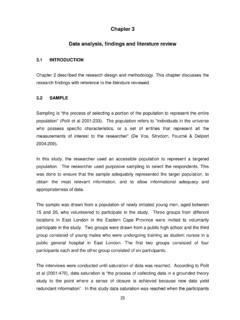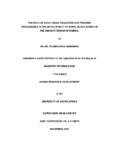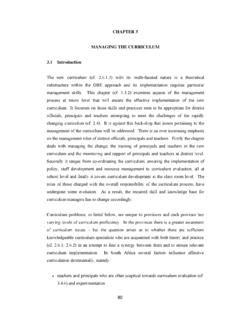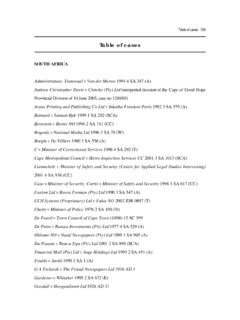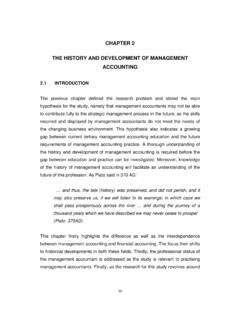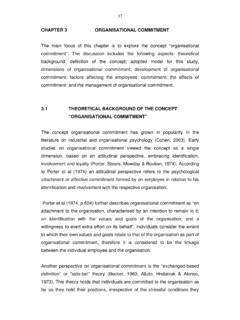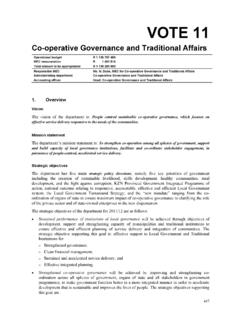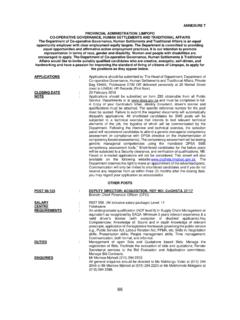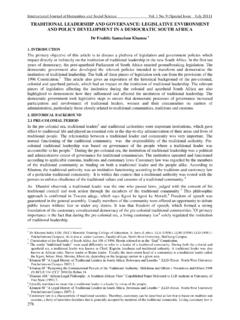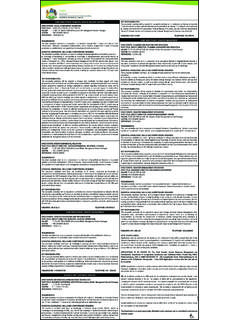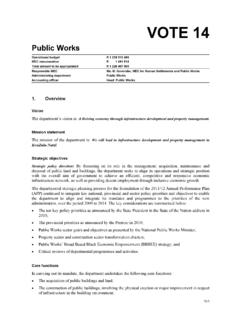Transcription of PERFORMANCE MANAGEMENT SYSTEM AND IMPROVED …
1 PERFORMANCE MANAGEMENT SYSTEM AND IMPROVED PRODUCTIVITY: A CASE OF THE DEPARTMENT OF LOCAL GOVERNMENT AND HOUSING IN THE LIMPOPO province by PANDELANI HARRY MUNZHEDZI Submitted in accordance with the requirements for the degree of MASTER OF ADMINISTRATION in the subject PUBLIC ADMINISTRATION at the UNIVERSITY OF SOUTH AFRICA SUPERVISOR: PROFESSOR KG PHAGO JOINT SUPERVISOR: MS VPP DISOLOANE OCTOBER 2011 ii ACKNOWLEDGEMENTS My sincere appreciation and thanks are expressed to the following persons who contributed immensely in the completion of this study: My supervisor, Professor KG Phago and joint supervisor, Mrs VPP Disoloane for their constructive criticism, creative input and competent academic guidance. Prof Phago, you always gave me a sense that I can make it even when things seemed difficult.
2 Mrs Lynne Southey, for her professionalism, cooperation and understanding in editing my dissertation. My brothers, Moses, Phillip, James, Rudzani and Farisani, for always believing in me at all times. You continuously gave me unconditional support. My father Mr Mulimisi Phineas Munzhedzi and My late mother, Mrs MM Munzhedzi for inspiring me to do better in life. The Almighty God for always being the pillar of strength and inspiration. To Him be the glory, the honour and the adoration. iii DECLARATION STUDENT NUMBER 4077- 673-5 I declare that PERFORMANCE MANAGEMENT SYSTEM AND IMPROVED PRODUCTIVITY: A CASE OF THE DEPARTMENT OF LOCAL GOVERNMENT AND HOUSING IN THE LIMPOPO province is my own work and that all the sources that I have used and quoted have been indicated and acknowledged by means of complete references.
3 SIGNATURE DATE (MR PH MUNZHEDZI) iv ABSTRACT The PERFORMANCE MANAGEMENT SYSTEM (PMS) has been introduced in the South African public service with the intentions of monitoring, reviewing, assessing PERFORMANCE , developing underperformers, and recognising and rewarding good PERFORMANCE . This study was undertaken as an attempt to investigate whether the PMS of the Department of Local Government and Housing (DLGH) in the Limpopo province contributes to the improvement in departmental productivity. The literature review undertaken in this study shows that there is a general poor understanding of PMS in the public service and in the DLGH in particular. It (the literature review) further establishes that there are several challenges that hinder the effective implementation of a PMS in the public service.
4 Other findings of the study include that there is a challenge of biased ratings (subjective assessment), and a setting of unrealistic PERFORMANCE targets which are unrealisable by employees. The foregoing justifies the reasons why productivity levels are not always realised and targets not achieved by the DLGH. The main finding of the study is that, although it plays a significant role in the improvement of productivity, the PMS has not contributed to the improvement of productivity of the DLGH in the Limpopo province . The main recommendation on the basis of this finding is that there should be a regular and thorough training of officials within the DLGH about the PMS and how it influences productivity.
5 Other additional recommendations include, inter alia, that the Departmental Moderating Committee should demand verifiable evidence to justify a higher rating during quarterly assessments, and that punitive/disciplinary measures be taken against those who do not comply with the provision of the PMS policy, particularly failure to submit PERFORMANCE instruments. v KEYWORDS Department of Local Government and Housing (DLGH) in the Limpopo province Memorandum of Understanding (MOU) on PERFORMANCE Pay progression PERFORMANCE agreement PERFORMANCE bonus PERFORMANCE instruments PERFORMANCE MANAGEMENT SYSTEM PERFORMANCE targets Productivity Training vi TABLE OF CONTENTS CHAPTER 1 GENERAL INTRODUCTION PAGE NO INTRODUCTION 1 BACKGROUND TO THE STUDY 1 PROBLEM STATEMENT 4 RESEARCH QUESTIONS 5 RESEARCH OBJECTIVES 5 CONCEPTUALISATION 6 METHOD OF DATA COLLECTION.
6 ANALYSIS AND INTERPRETATION 8 REFERENCE TECHNIQUES 9 SEQUENTIAL ARRANGEMENT OF CHAPTERS IN THE DISSERTATION 9 CHAPTER 2 LITERATURE REVIEW- PERFORMANCE MANAGEMENT SYSTEM INTRODUCTION 12 UNDERSTANDING A LITERATURE REVIEW AS A CONCEPT 12 PERFORMANCE MANAGEMENT IN THE PUBLIC SERVICE 14 CONCLUSION 21 CHAPTER 3 REGULATORY FRAMEWORK UNDERPINNING PERFORMANCE MANAGEMENT SYSTEM INTRODUCTION 22 LEGISLATIVE AND REGULATORY FRAMEWORK 22 vii Constitution of the Republic of South Africa of 1996 23 Public Service Act, 1994 (Proclamation 103 of 1994) 23 Skills Development Act, 1998 (Act 97 of 1998) 24 Labour Relations Act, 1995 (Act 66 of 1995) 25 Public Finance MANAGEMENT Act, 1999 (Act 1 of 1999) 26 Public Service Regulations, 2001 26 White Paper on Human Resource MANAGEMENT in the Public Service of 1997 27 White Paper on Public Service Training and Education of 1998 29 White Paper on Transforming Public Service Delivery (Batho Pele) of 1997 30 Public Service Coordinating Bargaining Council Resolution 13 of 1998 32 REGULATORY FRAMEWORK FOR SOUTH AFRICAN MUNICIPALITIES 33 Local Government: Municipal Systems Act, 2000 (Act 32 of 2000) 34 Local Government: Municipal Financial MANAGEMENT Act, 2003 (Act 56 of 2003) 35 Local Government: Municipal Structures Act, 1998 (Act 117 of 1998) 36 Local Government.
7 Municipal Planning and PERFORMANCE MANAGEMENT Regulations of 2001 37 White Paper on Local Government of 1998 38 PERFORMANCE MANAGEMENT GUIDE FOR MUNICIPALITIES OF 2001 39 STEPS IN THE DEVELOPMENT OF A SUCCESSFUL PERFORMANCE MANAGEMENT SYSTEM 41 Designing a policy framework 42 Developing the SYSTEM 43 Signing of PERFORMANCE agreement 43 Measuring PERFORMANCE 44 Managing the outcomes of PERFORMANCE appraisals 45 ROLE PLAYERS IN THE PERFORMANCE MANAGEMENT viii SYSTEM 46 Public Service Commission 46 Department of Public Service and Administration 47 Public Administration Leadership and MANAGEMENT Academy 48 Trade unions 48 PERFORMANCE MANAGEMENT SYSTEM POLICY OF THE DEPARTMENT OF LOCAL GOVERNMENT AND HOUSING 49 CONCLUSION 54 CHAPTER 4 RESEARCH DESIGH AND METHODOLOGY INTRODUCTION 55 RESEARCH DESIGN AND METHODOLOGY 56 Quantitative approach 58 Qualitative approach 58 DATA COLLECTION METHODS 59 Semi-structured questionnaire 60 Documentary analysis 62 Observations 63 SELECTION OF SAMPLE METHOD AND RESEARCH AREAS 64 DATA ANALYSIS 65 CONCLUSION 66 CHAPTER 5 DATA ANALYSIS AND RESEARCH FINDINGS INTRODUCTION 67 FINDINGS FROM THE QUESTIONNAIRE AND ANALYSIS 67 Respondents definition of PERFORMANCE MANAGEMENT 68 Employees understanding of PERFORMANCE MANAGEMENT SYSTEM 69 ix Understanding of PERFORMANCE MANAGEMENT SYSTEM by
8 Supervisors 70 General understanding of PERFORMANCE MANAGEMENT SYSTEM in the Department 71 Improving understanding of PERFORMANCE MANAGEMENT SYSTEM 72 Departmental PERFORMANCE from April 2007 to March 2010 72 PERFORMANCE and productivity 73 Support services by PERFORMANCE MANAGEMENT SYSTEM division 75 Skills and capacity of PERFORMANCE MANAGEMENT SYSTEM officials 75 PERFORMANCE bonuses and pay progression for good PERFORMANCE 76 Contributions of training to PERFORMANCE and productivity 77 Challenges facing PERFORMANCE MANAGEMENT SYSTEM and improvement of productivity in the Department 78 MANAGEMENT of underperformance as a challenge 79 MANAGEMENT of subjective assessments 80 Departmental budget allocation for rewarding good performers 81 MANAGEMENT of non-submission as a challenge 82 Additional issues relating to PERFORMANCE MANAGEMENT SYSTEM 83 FINDINDS FROM DOCUMENTARY ANALYSIS 84 Financial year 2007/2008 85 Financial year 2008/2009 87 Financial year 2009/2010 90 CONCLUSION 93 CHAPTER 6 CONCLUSION AND RECOMMENDATIONS INTRODUCTION 94 CHAPTER SUMMARY 94 CONCLUSION 97 RECOMMENDATIONS 98 x LIST OF SOURCES 101 ANNEXURES Annexure 1 : SEMI-STRUCTURED QUESTIONNAIRE 107 Annexure 2 : APPROVAL TO UNDERTAKE RESEARCH STUDY 112 TABLES Table : Purposive sampling procedure 64 Table : Summary of targeted and actual PERFORMANCE for 2007/08 financial year 85 Table.
9 Summary of targeted and actual PERFORMANCE for 2008/09 financial year 87 Table : Summary of targeted and actual PERFORMANCE for 2009/10 financial year 90 1 CHAPTER 1 GENERAL INTRODUCTION INTRODUCTION The effective MANAGEMENT of individual PERFORMANCE is critical to the execution of institutional strategy and the achievement of strategic objectives. Institutions tend to put more focus on the formulation of strategies than on the strategy implementation which requires good PERFORMANCE by all employees (from junior employees to MANAGEMENT ) in the institution. Human effort in the execution of formulated strategies and the need to direct such effort towards the strategic objectives of that particular institution should be paramount.
10 This study will focus on the PERFORMANCE MANAGEMENT SYSTEM as a strategy used to enhance PERFORMANCE in the public service. The focus will be on whether the introduction of a PERFORMANCE MANAGEMENT SYSTEM (PMS) contributes to the improvement of productivity in the public service with particular focus on the Department of Local Government and Housing (DLGH)1 in the Limpopo province . A background to the study is briefly undertaken in order to provide a basis for the problem statement and research objectives. Productivity will also be discussed with an emphasis on the public service and its link to PERFORMANCE MANAGEMENT . Thereafter, key concepts are clarified, and the method of data collection will be described and interpreted.
